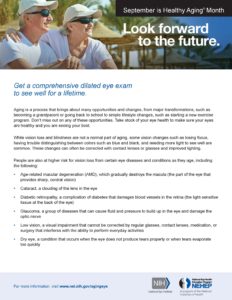Get a comprehensive dilated eye exam to see well for a lifetime
 Aging is a process that brings about many opportunities and changes, from major transformations, such as becoming a grandparent or going back to school to simple lifestyle changes, such as starting a new exercise program. Don’t miss out on any of these opportunities. Take stock of your eye health to make sure your eyes are healthy and you are seeing your best.
Aging is a process that brings about many opportunities and changes, from major transformations, such as becoming a grandparent or going back to school to simple lifestyle changes, such as starting a new exercise program. Don’t miss out on any of these opportunities. Take stock of your eye health to make sure your eyes are healthy and you are seeing your best.
While vision loss and blindness are not a normal part of aging, some vision changes such as losing focus, having trouble distinguishing between colors such as blue and black, and needing more light to see well are common. These changes can often be corrected with contact lenses or glasses and improved lighting.
People are also at higher risk for vision loss from certain eye diseases and conditions as they age, including the following:
- Age-related macular degeneration (AMD), which gradually destroys the macula (the part of the eye that provides sharp, central vision)
- Cataract, a clouding of the lens in the eye
- Diabetic retinopathy, a complication of diabetes that damages blood vessels in the retina (the light-sensitive tissue at the back of the eye)
- Glaucoma, a group of diseases that can cause uid and pressure to build up in the eye and damage the optic nerve
- Low vision, a visual impairment that cannot be corrected by regular glasses, contact lenses, medication, or surgery that interferes with the ability to perform everyday activities
- Dry eye, a condition that occurs when the eye does not produce tears properly or when tears evaporate too quickly
September is Healthy Aging® Month
For more information, visit www.nei.nih.gov/agingeye
A program of the National Institutes of Health

